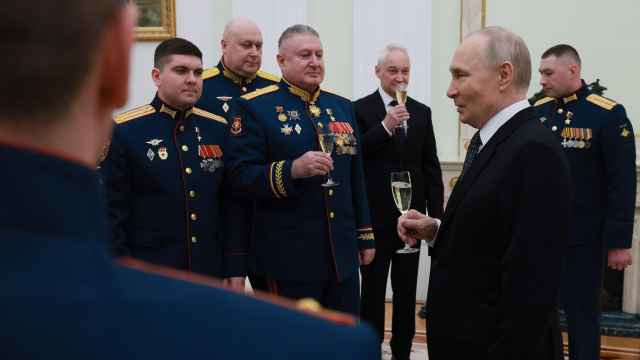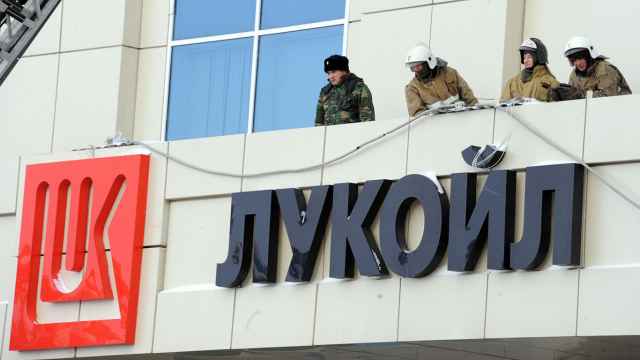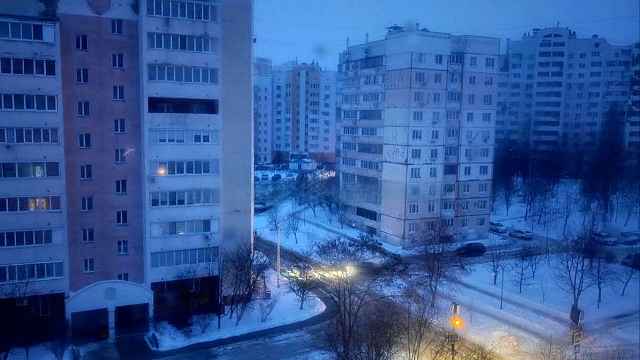On a Saturday evening in February, journalist Polina Petruseva was detained by police at her apartment in the western Russian city of Smolensk, accused of publicly flaunting Nazi imagery.
Several weeks later, on March 2, she was convicted by a local court and fined 1,000 rubles ($20). Her crime? Posting a photograph on the social media site VKontakte of Nazi troops in her neighborhood during the World War II occupation of the city.
"The shock was, of course, powerful," Petruseva told The Moscow Times in written comments. "I was shown a screenshot of my page [at the police station] and it was clear that everything was serious, but, even so, I couldn't help thinking it was some sort of surrealistic rubbish."
The photograph she posted is available on other websites, including Wikipedia, Petruseva said. One appeal against the conviction was dismissed, and she has lodged a second.
Petruseva's case is just one of a series of such incidences this year when law enforcement bodies have opened cases based on controversial legislation criminalizing the propaganda or rehabilitation of Nazism that was signed into law in May 2014 by President Vladimir Putin.
Experts said that the trend raises worrying questions for journalists, archivists, museum curators and historians who could be caught up by a broader interpretation of the law.
Widening Net
Russia's Investigative Committee said Tuesday that a criminal case had been opened against a 16-year-old boy in the southern city of Astrakhan after he allegedly expressed admiration for the 1939 Nazi invasion of Poland on a social networking site.
If found guilty, the teenager faces up to three years in prison.
"The law is excessive and this case is excessive. … The teenager is 16 years old and his audience is small," said Natalya Yudina, an expert at the SOVA Center, a Moscow-based research center that monitors extremism.
The criminal case in Astrakhan is the first of its kind involving the Internet, according to Yudina.
Incidents involving the anti-Nazi legislation have blossomed in recent months. Russian investigators reportedly targeted those selling toy soldiers and small busts in Nazi uniforms, cigarette lighters with Nazi imagery and even women's shoes decorated with a design that looked like Wehrmacht insignia.
Ukraine, Victory
The campaign against Nazi imagery appears to have been stoked by the fervor surrounding Russia's celebration of the 70th anniversary of the victory over fascism in 1945 earlier this month, and the ongoing confrontation with Western countries over events in Ukraine.
Moscow police carried out raids ahead of Victory Day on May 9th to find objects with swastikas on sale in the Russian capital.
In comments to The Moscow Times, prominent historian, television presenter and member of Russia's Public Chamber Nikolai Svanidze said of the spiraling hunt for Nazi imagery: "It's a black cat in a black room and there's actually no black cat."
Use of anti-Nazi legislation has also apparently been encouraged by Russian officials and state media outlets, which conflate the Soviet Union's victory against Nazi Germany in 1945 and the Kremlin's annexation of Crimea last year and have frequently described the government in Kiev as "fascist."
"Everything linked with the anniversary of victory is now mixed up with the unification of Crimea … that Crimea is today's Berlin, that Putin is today's Stalin," Svanidze said.
Controversial Law
Anti-Nazi legislation was originally proposed under then-President Dmitry Medvedev in 2009, but was postponed. It was finally passed last year following a dispute over a poll by liberal television station Dozhd about the justification of defending Leningrad from the Nazis during a long and bloody Nazi blockade.
The Kremlin has repeatedly warned of attempts to rewrite the history of World War II. "It is our duty today to oppose the glorification of Nazism," Putin wrote in an October article.
The law, which stipulates punishments ranging from fines to five years in prison, was co-authored by Kremlin loyalist and ultraconservative State Duma deputy Irina Yarovaya.
There were no convictions under the law in 2014, according to official statistics.
Despite the eagerness of police this year, there have also been signs that the authorities are seeking to curb the zeal of law enforcement bodies.
In April, after bookshops in Moscow withdrew the famous anti-Nazi graphic novel "Maus" by Art Spiegelman from their shelves because of a swastika on its cover, Kremlin spokesman Dmitry Peskov urged that while the law must be complied with, "a sense of proportion must be maintained" in enforcing it, in comments carried by Russian media at the time.
That same month, Internet watchdog Roskomnadzor stated that in enforcing the law, it is important to examine any potential violation in its full context in order to determine whether it in fact aimed to arouse hatred and hostility, or whether the goal was more benign.
Both of these comments give reason for optimism that Smolensk journalist Petruseva's appeal against her conviction for promoting Nazi imagery will be granted, according to Ivan Slivkin, Petruseva's lawyer.
Fears Sparked
Others do not anticipate a letup. The number of cases under the anti-Nazi legislation is likely to increase now that investigators have a taste for it, according to SOVA's Yudina.
And experts warn that the law is so vague it could be applied selectively. Law enforcement officers earn recognition and climb the professional ranks largely based on the number of criminal cases they open under specific articles of the Criminal Code, thus making vaguely worded laws all the more appealing. Critics have widely denounced this advancement scheme as a path toward frivolous prosecution.
There are some signs that fear is already beginning to spread. After "Maus" disappeared from Moscow bookshelves, the curators of a World War II exhibition in Petropavlovsk-Kamchatsky in Russia's Far East last month reportedly covered up photos of swastikas with stickers.
The law raises questions about historical truth when discussing the relationship between Nazi Germany and the Soviet Union in the late 1930s, according to historian and journalist Pavel Aptekar. The two countries signed a controversial alliance, the Molotov-Ribbentrop Pact, in 1939.
Others warned that the law was not designed to be employed widely at the present moment, but could be actively and selectively enforced when it suited the authorities.
"It's like a Damocles sword hanging above us all," said Svanidze.
Contact the author at [email protected]
A Message from The Moscow Times:
Dear readers,
We are facing unprecedented challenges. Russia's Prosecutor General's Office has designated The Moscow Times as an "undesirable" organization, criminalizing our work and putting our staff at risk of prosecution. This follows our earlier unjust labeling as a "foreign agent."
These actions are direct attempts to silence independent journalism in Russia. The authorities claim our work "discredits the decisions of the Russian leadership." We see things differently: we strive to provide accurate, unbiased reporting on Russia.
We, the journalists of The Moscow Times, refuse to be silenced. But to continue our work, we need your help.
Your support, no matter how small, makes a world of difference. If you can, please support us monthly starting from just $2. It's quick to set up, and every contribution makes a significant impact.
By supporting The Moscow Times, you're defending open, independent journalism in the face of repression. Thank you for standing with us.
Remind me later.







